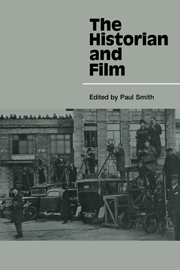Book contents
- Frontmatter
- Contents
- Preface
- The contributors
- Introduction
- I The raw material
- II Film as historical evidence
- III Film as historical factor
- IV Film in the interpretation and teaching of history
- 6 The historian as film-maker I
- 7 The historian as film-maker II
- 8 Film in university teaching
- 9 Film in the classroom
- 10 History on the public screen I
- 11 History on the public screen II
- Select bibliography
- Appendix: addresses of organisations involved with film and history
- Index
10 - History on the public screen I
Published online by Cambridge University Press: 05 November 2011
- Frontmatter
- Contents
- Preface
- The contributors
- Introduction
- I The raw material
- II Film as historical evidence
- III Film as historical factor
- IV Film in the interpretation and teaching of history
- 6 The historian as film-maker I
- 7 The historian as film-maker II
- 8 Film in university teaching
- 9 Film in the classroom
- 10 History on the public screen I
- 11 History on the public screen II
- Select bibliography
- Appendix: addresses of organisations involved with film and history
- Index
Summary
A certain experience of conference-going where historians and professionals of the media, film and television, congregate has taught me that there are a number of fundamental ‘false problems’ that have to be cleared out of the way before any intelligent discussion, let alone co-operation is possible.
That this process should be undertaken is, I take it, self-evident. For, at least on television, history has become big business. The Thames Television series The World at War was an enormous success both commercially and in its public reception. The B.B.C. series The Mighty Continent, though received with mixed feelings by television critics (of whom more anon) and professional historians, was also a considerable success. The degree of the success of these two series can be measured in the immense sales enjoyed in each case by the book of the series. On the other hand one has such monstrosities as the B.B.C.'s series on the British Empire, which was even denounced on the floor of the House of Lords, or its equally appalling Churchill's People, a series of historical playlets supposedly based on Winston Churchill's History of the English-Speaking Peoples, in which central episodes of English history are re-enacted as seen through the eyes of the ‘common people’.
The first of these false problems (indeed the first two) can best be expressed in opposed propositions as follows:
The historian's main concern is accuracy: the producer of film and television is concerned with entertainment. The unspoken premise of the first proposition is that to be accurate is to be dull. The unspoken premise of the opposed proposition is that to be entertaining it is necessary to distort or misrepresent.
- Type
- Chapter
- Information
- The Historian and Film , pp. 169 - 176Publisher: Cambridge University PressPrint publication year: 1976
- 2
- Cited by



